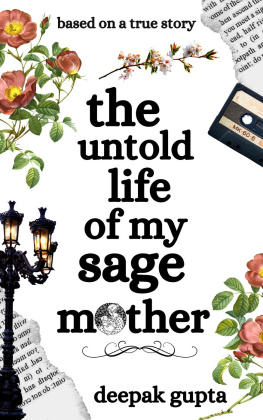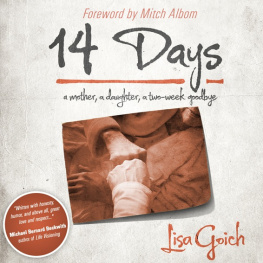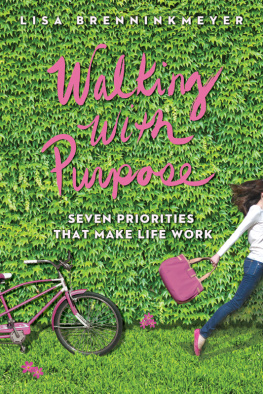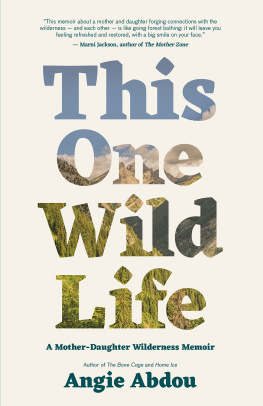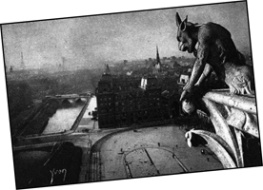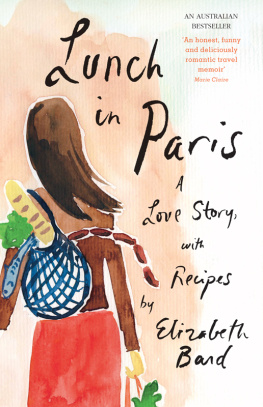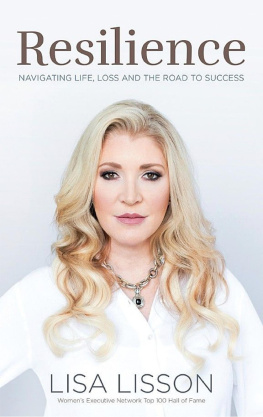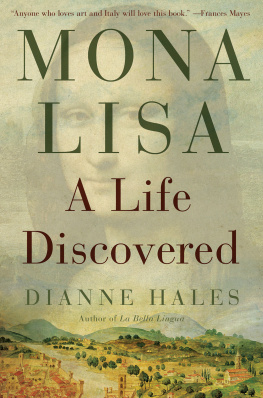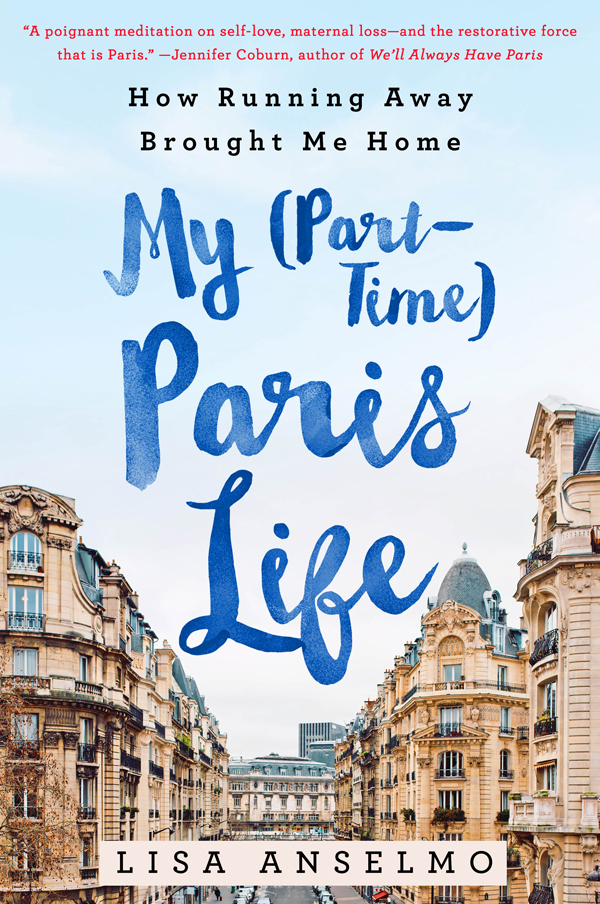Contents
Guide

The author and publisher have provided this e-book to you for your personal use only. You may not make this e-book publicly available in any way. Copyright infringement is against the law. If you believe the copy of this e-book you are reading infringes on the authors copyright, please notify the publisher at: us.macmillanusa.com/piracy.
For Ma
Paris too real and too beautiful.
It reaches in and opens you wide, and you stay that way.
An American in Paris
Who do you think you are?
This probably stops more people from doing more things than any other question. Who are you to want more? You think you deserve it? Really?
People say that greatness is inspiring, but what they really mean is only as long as its someone elses greatness, someone who lives on another plane, someone they saw portrayed in a film. Like Gandhi.
But greatness close up? In themselves? In you ? Terrifying.
Crabs in a bucket, a friend once called it. Just try to break out, shoot for more, and those around you will grab ahold and tug you back to reality. Who do you think you are? Are you better than us ?
Maybe its envyor fear of being shown theres a better way. Because once you know theres a better way, and you dont follow it, life in the bottom of that bucket becomes unbearable.
And who wants that? Better to stay where you are, where the misery is warm and familiar. Where you can tell yourself its good enough, and you should be lucky to have what you have.
My mother wanted more for herself. As a young girl she dreamed of being an artist. She had talent, too. When she was about ten years old, she saw an advertisement, once ubiquitous in magazines, featuring a drawing of a pirate or a turtle, with the headline Draw MeWin a 2-Year Art Scholarship! You drew your best copy of the character and sent it in. Then you won enrollment in an art school, along with art supplies, for which you received a bill. Of course, my mother was too young to understand; her passion drove her to take that chance, possibly the boldest in her life. Her parents did what any Depression-era immigrants would have done: they freaked out. My grandfather had to hire a lawyer with his meager masons income to get my mother out of the contract. That was the end of her dream, then and there.
When I was around the same age as my mother when she drew that pirate, I did nearly the same thing. My dream was to be a writer, so I sent my novel, all one hundred fourteen handwritten pages of it, to a publisher whose ad I saw in Tiger Beat magazine. Upon reviewing my masterwork, the publisher sent me a letter saying theyd love to publish meand would I please send a certified check for one hundred fifty dollars? My parents opened this letter before I did, after which they sat me down and gave me a lecture on taking risks that wasnt as inspirational as I think they imagined it was: they told me if I was serious theyd help me find a proper publisher, but something in their demeanor said, Whoa! You stop that! I wouldnt take writing seriously again for decades.
Who do you think you are?
The crabs-in-a-bucket thinking is passed down. Though Id done exactly as my mother had, she couldnt do anything but what her parents had taught her, and pulled me back from that scary unknown, keeping me safely tucked away with her.
We see greatness as foreign, intimidating; we even shame it out of people, out of ourselves. Were taught that humility is the noblest quality, but we confuse humility with shrinking away from the world. Even Gandhi led a nation while being humble.
Being your fullest self, putting yourself out into the world with arms and eyes widethats the greatness Im talking about. Knowing you deserve to be happy.
My mother didnt know she deserved happiness, and she passed that on to her children. No matter how great she told us we were, we learned more from watching how she treated herself. Its not really what other people say, is it? It always comes down to Mirror, mirror on the wall
Maybe its finally leaving that dead-end job, extracting yourself from a bad marriage, starting your own businesswhatever it is, theres a point when you realize you cant keep living this way: your head spins all day, you dont sleep anymore, you cant shake an overwhelming sense of dread. The only thing that keeps you going is the dream of something better, something more. You fixate on that, and it helps you wade through whatever muck youre mired in. You tell yourself, one day . One day youll make that move, and your life will begin for real.
But youre waiting. Waiting for that moment when everything will line up, when youll feel stronger, when youll have more money. When youll be really ready to make a change.
Except, Im here to tell you that moment is never coming.
Youre not waiting to be ready; youre waiting for someone to give you permission. Forget about it. Just start clawing your way out of that bucket.
I got out, eventuallywhen I was so deep down and buried in the dark and had only up to go. After I clawed my way out, I fell into Paris.
Thats when everything changed.
My mother was the most beautiful woman in the world. She was Audrey Hepburn thin, chic, and classy, always put together with her ever-present red lipstick. I pitied all the other kids because their mothers were not my mother. Ma was perfect in every way.
At least I thought so until I was four.
I was watching her put on her makeup one morning, something I loved doing, especially when she brushed on her liquid eyeliner with one sweeping motion, a delicate swoop at the outer corner of each eye. She was glorious; she was a princess.
Ugly, she said to her reflection in the mirror.
That word flipped my entire world on its edge, sending everything I believed flying. My mind scrambled to gather it up again, to make sense of it. If Ma was ugly, then what was I ? If Ma wasnt perfect and beautiful, then what was?
That was the day I learned about worthlessness.
Even before that day, I sensed Ma wasnt happy deep down. Not that I was fully aware of it, being so young, but I could feel something in the air that unsettled me.
Ma hadnt wanted to move to that one-horse town in New Jersey, away from our whole family in Buffalo, New York, a thriving metropolis of two million people. But Dad got transferred, so off we went. I was two and a half, but I still remember her tears.
Those first few years were the hardest; we knew no one in New Jersey, and with my father at work and my older sister, Maria, in school, it was just my mother and I most of the day. I remember tea parties with chocolate milk and peanut butter finger sandwichesand the weight of my mothers loneliness.
She used to say I was attached to her hip, but I wonder who needed whom more.
The day I went off to kindergarten, Ma cried all the way to the bus stop. That day, I learned that going out into the world was a scary thing. This was no way to inspire her little chick to fly, but that was Ma. She didnt know who she was without her children.
I was a fearful, clingy child. Maybe Ma made me that way, and maybe I was just sensitive and artistic like her. I spent a lot of time in my room reading, writing, dreaming. I didnt understand other children very welleven as a child, I thought them childish. I suppose I spent too much time with Ma. I adored her, hung on her every wordher every mood.
But then, we all did. Mas moods set the tone of the day for all of us. When she was happy, it was heaven. She doted on her childrenplayed with us, read to us. She had a tremendous sense of humor, could be giddy and silly, suddenly bursting into song, grabbing one of us for a jitterbug in the kitchen. Wed wail and roll our eyes, Maaaaa, stop it!


